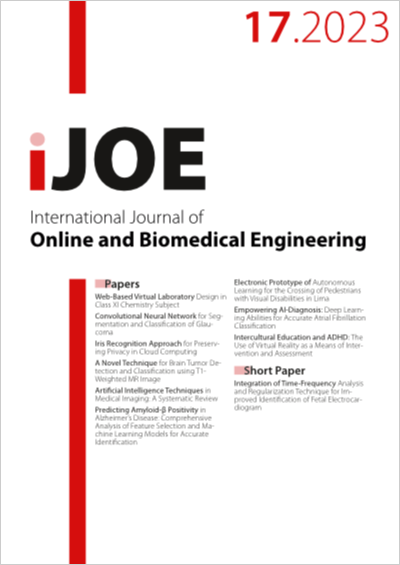Empowering AI-Diagnosis: Deep Learning Abilities for Accurate Atrial Fibrillation Classification
DOI:
https://doi.org/10.3991/ijoe.v19i17.42499Keywords:
atrial fibrillation, artificial intelligence, classification, deep learningAbstract
Artificial intelligence (AI) is a powerful technology that can enhance clinical decision-making and the efficiency of global health systems. An AI-enabled electrocardiogram (ECG) is an essential tool for diagnosing heart abnormalities such as arrhythmias. The most prevalent arrhythmia globally is atrial fibrillation (AF), which is an irregular heart rhythm that originates in the atria and can lead to other heart-related complications. A trusted AI classification of AF is explored in this study. Deep learning (DL) has been used to analyze large amounts of publicly available ECG datasets in order to classify normal sinus rhythm (NSR), AF, and other types of arrhythmias. A convolutional neural network (CNN) has been proposed to extract ECG features and classify ECG signals. Based on a 10-fold cross-validation strategy, we conducted experiments involving three scenarios for AF classification: (i) a balanced set, an imbalanced set, and an extremely imbalanced set; (ii) a comparison of ECG denoising algorithms; and (iii) the classification of AF, NSR, and other arrhythmia types (15 classes). As a result, we have achieved 100% accuracy, sensitivity, specificity, precision, and F1-score for the AF, NSR, and non-AF classifications, both for balanced and imbalanced sets. In addition, for the classification of AF, NSR, and other types of arrhythmia (15 classes), the performance results achieved an accuracy of 99.77%, sensitivity of 96.48%, specificity of 99.87%, precision of 97.03%, and F1-score of 96.68%. The results can empower AI diagnosis and assist clinicians in classifying AF on routine screening ECGs.
Downloads
Published
How to Cite
Issue
Section
License
Copyright (c) 2023 Bambang Tutuko, Annisa Darmawahyuni, Siti Nurmaini, Muhammad Naufal Rachmatullah, Firdaus Firdaus, Sutarno Sutarno, Rossi Passarella, Ade Iriani Sapitri, Anggun Islami, Muhammad Wahyu Ramansyah, Muhammd Isra Al Hadi

This work is licensed under a Creative Commons Attribution 4.0 International License.



